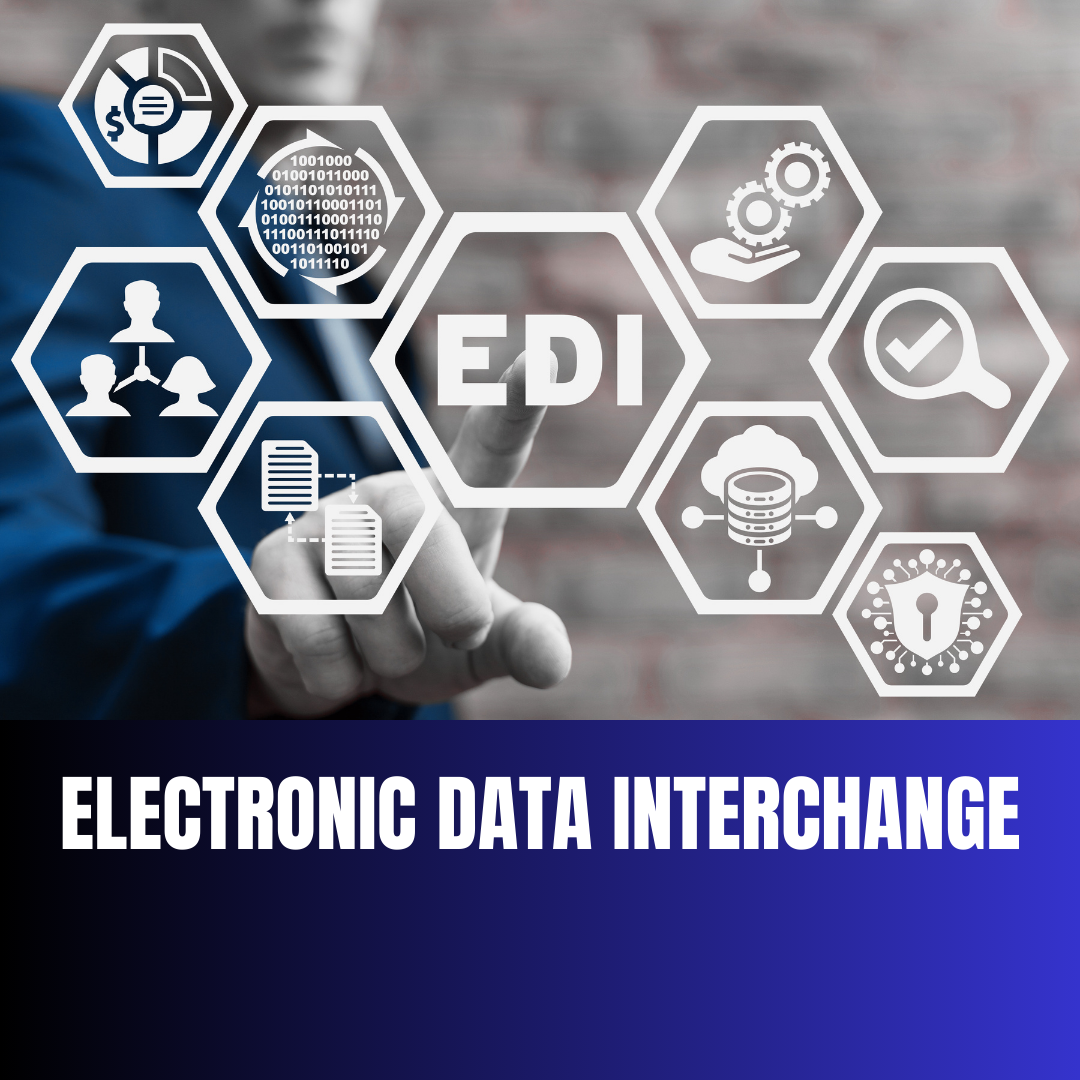The Business Need of EDI – Part 2
ABOUT THE COURSE
This course provides a comprehensive knowledge of Electronic Data Interchange (EDI) and its significance in streamlining business communication and processes. You will gain insights into the key components of EDI, industry standards, implementation strategies, and the hands-on practical skills needed for successful EDI integration.
By the end of this course, you will gain real-life skills in the various industries - manufacturing, healthcare, logistics, etc. - that use EDI for business data exchange, improve communication, reduce manual effort, and enhance efficiency.
The EDI training consists of online (pre-recorded videos) and live virtual (hands-on) training. The live sessions are instructor-led.
The Next Live-Virtual Session Starts on Saturday, December 7, 2024, and ends on Saturday, December 28, 2024.
Live Session Days and Time: Saturdays, 7 am to 9 am EST (US and Canada).
Get Immediate Access to Pre-Recorded Classes, Materials, Tests, and Projects after Registration.
WHAT YOU WILL LEARN:
- Fundamentals of EDI: Understand EDI, its historical development, and its pivotal role in business transactions.
- Key Components and Standards: Know the essential components of an EDI system, including various standards like X12, EDIFACT, and others.
- EDI Transaction Process: Learn how EDI transactions are structured, transmitted, and received across different industries.
- Benefits and Challenges: Discover how EDI streamlines business processes and reduces costs, as well as some common challenges faced during implementation.
- Benefits and Challenges: Discover how EDI streamlines business processes and reduces costs, as well as some common challenges faced during implementation.
- Real-World Applications: Through our hands-on practical, examine case studies and experience real-world applications of EDI in industries like retail, manufacturing, healthcare, and logistics. This includes multiple mapping exercises, protocol utilization, data analysis, and other hands-on EDI-related activities that help our students gain real-life EDI integration experience.
- Future Trends in EDI: This section examines emerging trends and the future landscape of EDI, including its integration with technologies like blockchain and AI.
Course Detail:
About the Live Session: The live virtual sessions are conducted by an instructor and are organized into three progressive levels: foundation, intermediate, and experiential. Registration is required only once to access all three levels included in your enrollment.
- Learn the basics of EDI standards and business use cases in Modules 1 & 2.
- Introduced to Mapping, fixing errors, and utilizing protocols in Modules 3 & 4.
- Real-world project-based practicals with access to industry-recognized EDI software tools in Modules 5.
Live Session on Zoom Schedule: You will gain immediate access to the pre-recorded classes and course Zoom link to join the live-virtual class.
Course Duration: 4 Weeks of live-virtual and 12 weeks of access to the pre-recorded video.
This course is designed for ambitious learners who are ready to go out in the field as soon as possible. Our comprehensive training is your gateway to becoming an industry change-maker. Enroll now and stand out in your professional field with unparalleled EDI expertise.
Course Content:
- Pre-recorded classes.
- Live virtual meetings on Zoom.
- Weekly assignments and quizzes, module tests, projects, and group discussions.
- Reading materials.
- Setting New Trading Partners(10 Trading Partners)
- Mapping Project(10 Mapping Project)
- Setting Up Protocols( AS2, SFTP, VAN)
- Fixing errors and retransmit to trading Partners
- A final exam and capstone project.
What You Get:
- Advanced Modules: In-depth coverage of complex EDI topics, such as integration techniques, advanced transaction sets, and customization for specific industries.
- Exclusive Materials and Assessments: You will have access to comprehensive study materials, tests, and quizzes to solidify your understanding and track progress.
- Practical Hands-On Experience: Opportunities to work with EDI mapping and testing software, giving you practical skills that are crucial for real-world application.
- Projects and Capstone Project: Engagement in projects that simulate real-world EDI scenarios, culminating in a capstone project showcasing your ability to comprehensively apply EDI knowledge.
- Access to Recorded Classes: You can learn at your own pace and revisit complex topics through recorded sessions.
- Certification: Earning a certificate upon successful completion, which can be a valuable addition to your professional credentials.
- Career Support Services: Access to career services such as resume reviews, interview preparation, and networking opportunities.
Course Format:
This course is a mix of online and live virtual. Each Module includes pre-recorded classes that give you the flexibility needed to pause and replay each lesson. Students are then encouraged to join Zoom once a week for live discussions and practical lessons.
Who Should Enroll:
Anyone with a passion for business data exchange and foundational knowledge of business. No prior experience is needed.
IT Professionals and System Administrators: Those responsible for managing and maintaining IT systems, especially in organizations that use or plan to use EDI for data exchange.
Business Analysts: Analysts who work with business process modeling and improvement, especially in sectors where EDI is prevalent, like retail, healthcare, supply chain, and logistics.
Software Developers and Engineers: Developers working on business software solutions where integration with EDI systems is required or those interested in developing EDI solutions.
Project Managers: Managers overseeing projects that involve EDI need to understand the intricacies of EDI integration for effective project planning and execution.
Data Analysts and Data Scientists: Professionals dealing with large data sets, where understanding EDI can aid in data integration, transformation, and analysis processes.
Supply Chain and Logistics Professionals: Those working in supply chain management or logistics, where EDI is often used for transactions like purchase orders, invoices, and shipping notices.
ERP Specialists: Professionals specializing in Enterprise Resource Planning (ERP) systems, as EDI integration is often crucial for ERP implementations in larger organizations.
Financial Professionals: Accountants, auditors, and financial analysts in organizations that use EDI for financial transactions and reporting.
Students and Academics: Students and academic professionals in fields related to business, information technology, supply chain management, or logistics, who are looking to enhance their knowledge and employability in these areas.
Technology Enthusiasts and Entrepreneurs: Individuals interested in the technological aspects of business operations or entrepreneurs planning to venture into businesses where EDI is relevant.
Career Changers: Professionals looking to transition into roles that involve EDI, or to industries where EDI is a critical component of business operations.
Software For this course:
Microsoft Teams: We use Teams for communication (chat, video calls), collaboration (file sharing, co-authoring), and integration with other Microsoft and third-party applications.
Boomi: Dell Boomi is a cloud-based integration platform as a service (iPaaS). It enables students to integrate cloud and on-premises applications, data, and processes.
STEDI: Students use this application to provide tools and services to translate, validate, and manage EDI transactions, often focusing on simplifying and modernizing EDI processes.
Lanham MFT Gateway: Students use Lanham to provide solutions for Microsoft Dynamics 365 Business Central and NAV. The MFT (Managed File Transfer) Gateway will be a solution for secure, reliable data transfers, commonly used in EDI and other business data exchanges.
MuleSoft: An integration platform for connecting various applications, data, and devices. MuleSoft’s Anypoint Platform will be used by students to enable API-led connectivity, both in the cloud and on-premises.
Notepad++: A popular, free source code editor for Windows. It's used by students for editing plain text and writing code in various programming languages. Notepad++ offers features like syntax highlighting, regular expression search, and folding.
And other EDI software.
Capstone Project Completion: Your Gateway to Opportunities
Upon completing this course, you will receive the EDI capstone project that you may showcase on your portfolio.
Contact: If you're experiencing any issues or have any questions, we're here to help! Please don't hesitate to reach out to us at support@echolinksolutions.com. Our dedicated support team is committed to providing you the assistance you need.
Cost:
The total cost of the EDI course is $1500.00.
Your Future Awaits: Echolink Solutions and Beyond
This is your chance to transition from academia to industry, and we are here to support you in every step of your career journey. Whether you envision yourself contributing to innovative projects at Echolink Solutions or exploring opportunities with our partner companies, the possibilities are vast.


